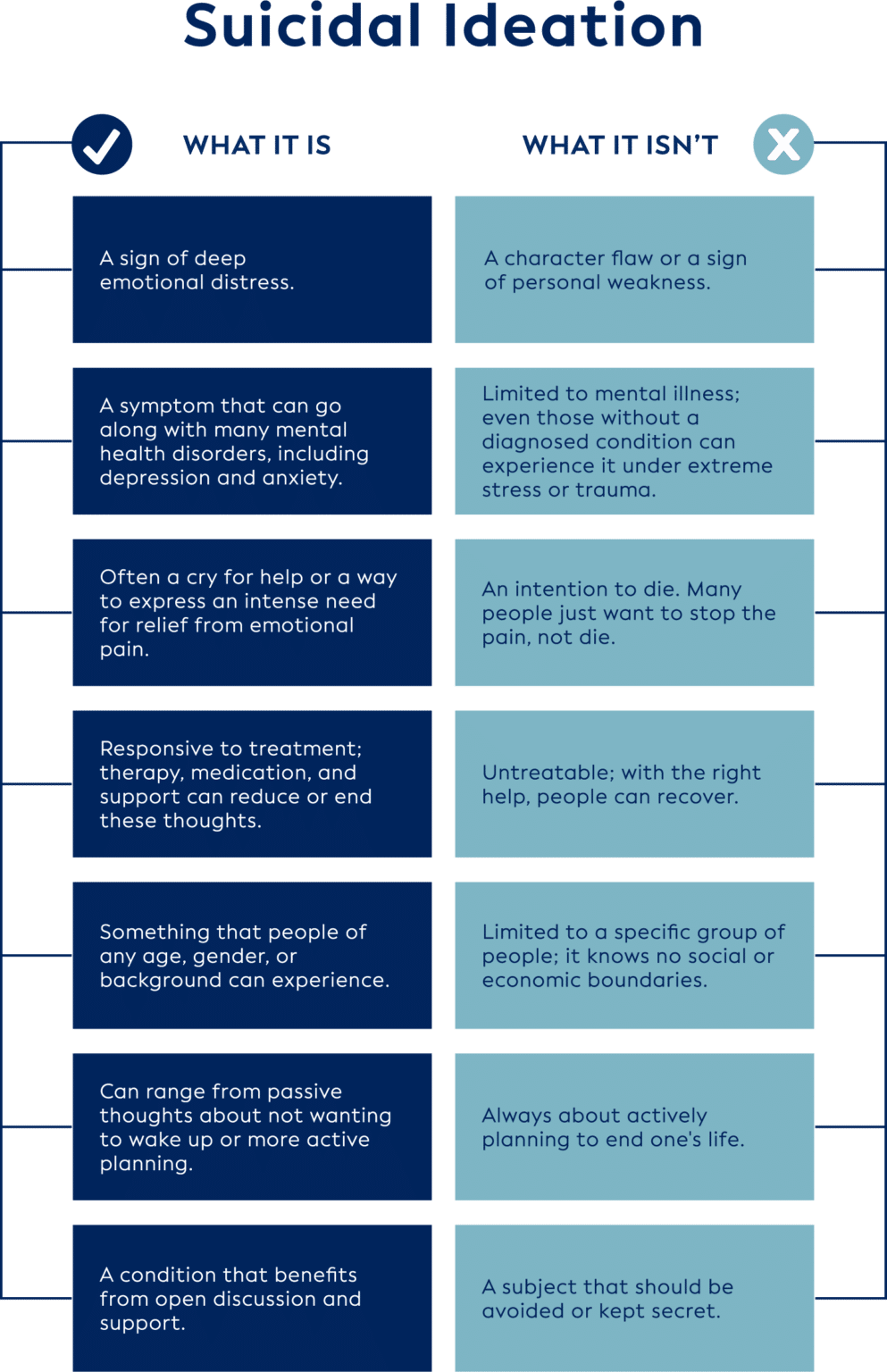A MISSION FOR MICHAEL
We specialize and treat a variety of mood and thought disorders.

You’re in a fight for your own survival, and you’re not sure you can win.
When you think about tomorrow, you just feel tired- how long can you keep fighting yourself?
It’s not just sadness, or stress, or circumstance that brought you here.
It’s a deep, relentless pain that makes the idea of not waking up seem like the only solution.
Talking about these feelings can be incredibly hard. Maybe you’re worried about the reactions you’ll get, like shock (“But you seem so happy!”) or criticism (“Other people have it harder than you do.”). So you try to keep it all to yourself, making you feel even more alone.
We want you to know that these feelings are more common than many realize—and more importantly, that they’re highly treatable.
At AMFM, we get it. We’re here to listen without judgment, and to offer hope without sugarcoating. Our team specializes in turning the tide against this kind of pain, so the thought of tomorrow brings hope, not dread.
The term “suicidal ideation” means thoughts about, considerations of, or preparations for suicide. These can range from fleeting thoughts to detailed plans. Just because a person is experiencing these thoughts doesn’t mean they will take their own life, however, it does mean they are in a serious state of distress and need help.
No one seems to want to talk about suicide. The secrecy can make people who are struggling feel alone and ashamed to speak up. It also allows false ideas about suicide to thrive, since misconceptions never get a chance to be corrected.
Here’s a quick rundown to clear up some of those myths and share the real deal about suicidal ideation.
| What Suicidal Ideation Is | What Suicidal Ideation Isn't |
|---|---|
| A sign of deep emotional distress. | A character flaw or a sign of personal weakness. |
| A symptom that can go along with many mental health disorders, including depression and anxiety. | Limited to mental illness– even those without a diagnosed condition can experience it under extreme stress or trauma. |
| Often a cry for help or a way to express an intense need for relief from emotional pain. | An intention to die – many people just want to stop the pain, not die. |
| Responsive to treatment; therapy, medication, and support can reduce or end these thoughts. | Untreatable; with the right help, people can recover. |
| Something that people of any age, gender, or background can experience. | Limited to a specific group of people; it knows no social or economic boundaries. |
| Can range from passive thoughts about not wanting to wake up or more active planning. | Always about actively planning to end one's life. |
| A condition that benefits from open discussion and support. | A subject that should be avoided or kept secret. |

A variety of factors can contribute to suicidal ideation, including psychological, social, biological, and environmental factors. Common contributors include:
Mental Health Disorders: Conditions like depression, anxiety, bipolar disorder, and schizophrenia can include suicidal ideation as a symptom.
Traumatic Stress: Experiences of abuse, violence, loss, or other traumas can lead to feelings of hopelessness and thoughts of suicide.
Substance Use: Alcohol and drug use can exacerbate mental health issues or create feelings of desperation that contribute to suicidal thoughts.
Life Situations: Relationship problems, financial pressures, and other stressful life events can sometimes trigger suicidal ideation in individuals who see no other way out of their situation.
Identifying suicidal ideation isn’t easy when so many people feel they need to keep these thoughts to themselves. Signs can include:
Thinking about suicide or death doesn’t mean you’re broken or beyond help. Suicidal thoughts are a symptom, not a character flaw, and they point to a need for compassionate, professional support.

At AMFM, we approach suicidal ideation with the sensitivity and seriousness it demands. We’re committed to normalizing these conversations, offering a space where individuals can explore the root causes of their despair without fear of judgment. Most importantly, we specialize in providing evidence-based treatments that have been proven to work for people struggling to keep going.
Choosing AMFM for help with suicidal thoughts means you’re turning to professionals who genuinely understand the depth of your struggle. We want to do more than just get you through the night, we want to address the pain at its root and find a path forward, keeping you safe until you feel like yourself again. We’ve created an environment that’s safe and understanding, where talking about how you’re feeling isn’t met with judgment but with open arms and expert support.
Our approach marries compassion with cutting-edge scientific understanding. Your struggle isn’t just emotional; it might also be tied to imbalances or issues in brain chemistry that are beyond your control. By listening to your story and applying our expertise, we’re able to offer solutions that address both the narrative of your experience and any underlying biological factors. This might include therapy that resonates with you personally, medication to help balance brain chemistry, and strategies to strengthen your mental and emotional resilience.
At AMFM, we see the whole picture — the human story of your struggle and the science behind it. You’re supported by a team that is committed to your recovery and equipped with the tools to address both the psychological and biological aspects of the issue. We’re here to let you know that healing is possible- there’s a future where you feel balanced, understood, and genuinely hopeful about life again.
At AMFM, we combine professional expertise with a deeply compassionate understanding of what you’re going through. Here’s how we make sure our program offers the best support for those facing these tough thoughts.
We keep our patient-to-staff ratios low, ensuring you get the focused, personalized attention you need. This means we have the time and space to really listen to your story, understand your pain, and tailor our support specifically to you.
Our centers are designed to be peaceful sanctuaries, places where you can feel safe and calm as you work through your struggles.
Dealing with suicidal thoughts requires specific knowledge and sensitivity, and our team has that in spades. We’re not just mental health professionals; we’re specialists in understanding the complexities of suicidal ideation.
Our partnership with leading institutions like the Beck Institute means you benefit from the latest, most effective strategies in mental health care. But we don’t stop at clinical treatments; we also embrace a holistic approach that includes nutrition, physical wellness, and mindfulness practices to support your overall well-being.
We understand that there’s no one-size-fits-all solution for mental health. That’s why our treatment plans are as unique as you are, flexible to adapt to your needs, so you always receive the care you need.
We design every aspect of our care around you, from our empathetic, expert staff to our peaceful, supportive environment, making sure you have the best chance of finding your path to a better future.
Here’s how we approach treating suicidal ideation at AMFM:

Our first priority when dealing with suicidal ideation is to keep you safe. Our skilled nursing staff and care coordinators are trained to recognize both verbal and nonverbal cues of SI, but not judge them. We believe in creating a secure environment where you can express your feelings without fear of judgment. We try to normalize these thoughts as a natural part of larger emotional distress, reducing stigma and opening up honest channels for conversation.

Our treatment plans are totally personalized, built on comprehensive assessments that go deeper than symptoms into psychological and biological causes. With access to a wide variety of treatment modalities, we can be flexible and adaptable in how we treat suicidal ideations. A few of the tools we might use include:
Because we have so many resources available, we’re always capable of adjusting your treatment plan to meet your needs.
AMFM’s residential setting is a community designed to provide you with ongoing support. You’re encouraged to share your journey with loved ones, connect with others facing similar challenges, and build the resilience needed for recovery. Safety plans are not just a formality but a collaborative process, involving your support network to make sure you have what you need to thrive, even after you’ve left our facility.
We know from experience that the pain leading to suicidal thoughts doesn’t have to spell the end of your story. With an expert team by your side, you’ll find personalized, evidence-based treatments that speak to both the heart of your pain and its underlying causes. We blend compassion, understanding, and evidence-based treatment to provide an intervention that works.
Call us or start the process online today. All communication is confidential.
If we are not an appropriate provider for care, we will assist in finding a care provider that can help.
Our commitment to clinical excellence is reflected in our rigorous adherence to industry standards. We hold licenses and accreditations from respected regulatory bodies, ensuring that our services meet the highest levels of quality and compliance. Listed below are the certifications that endorse our dedication to providing safe, ethical, and effective care.
Copyright 2024 © A MISSION FOR MICHAEL
All rights Reserved | Privacy Policy